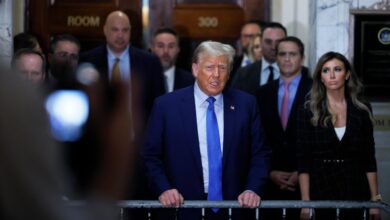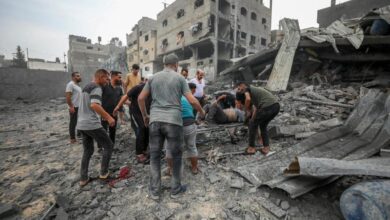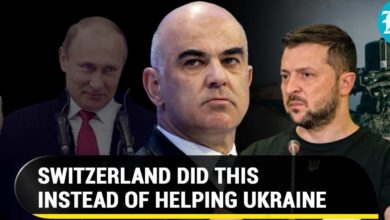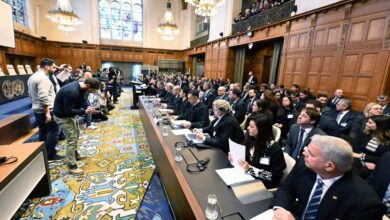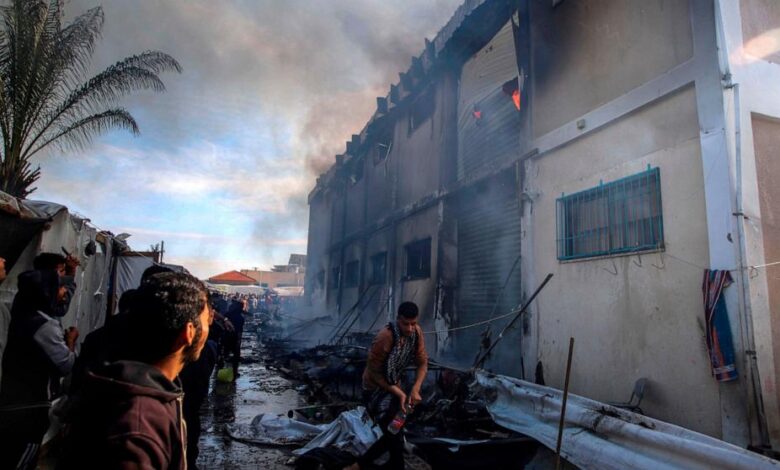
Gaza UNRWA Hamas Israel A Complex Conflict
Gaza UNRWA Hamas Israel: A complex and deeply intertwined history of conflict and humanitarian crisis unfolds, spanning decades of political maneuvering and human suffering. This narrative delves into the historical context, current situation, humanitarian impact, international response, the crucial role of UNRWA, Hamas’s position, and Israel’s perspective, providing a multifaceted understanding of this enduring struggle.
From the origins of UNRWA’s presence in the region to the current geopolitical factors shaping the conflict, this analysis illuminates the intricate web of relationships between these key players. The current humanitarian crisis, including the economic struggles and the impact on civilians, is also examined.
Historical Context
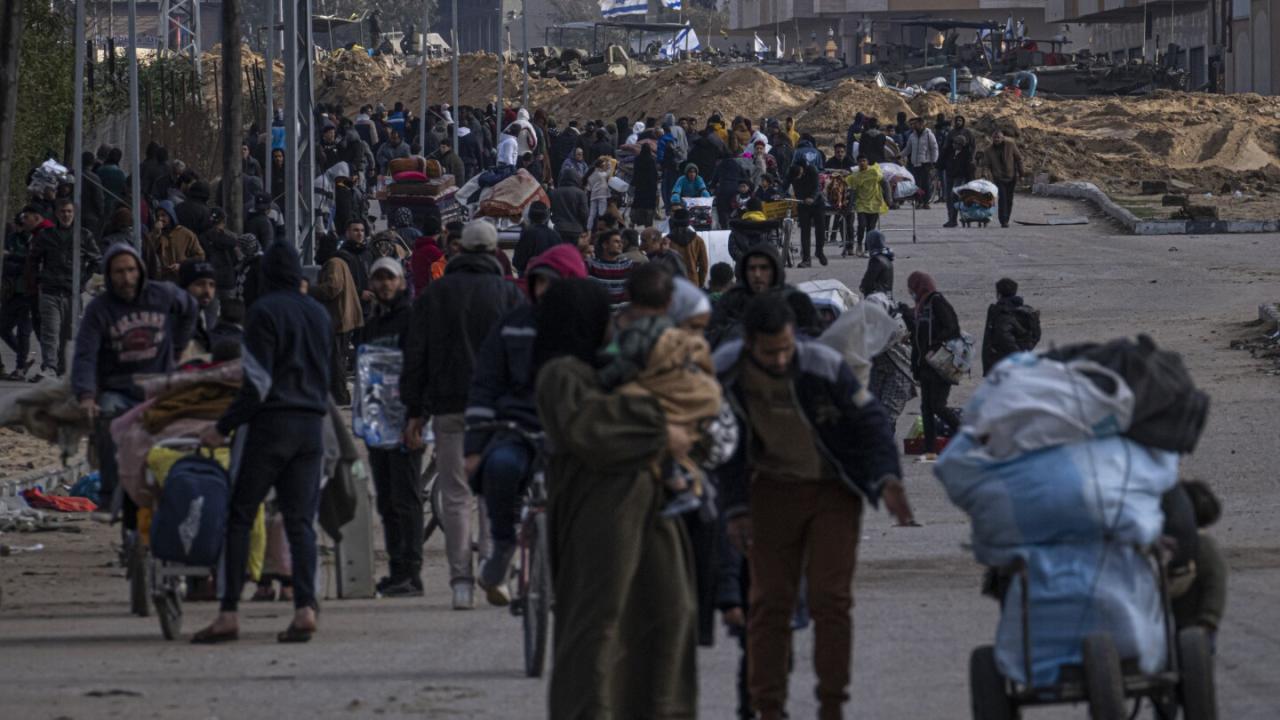
The interwoven history of Gaza, UNRWA, Hamas, and Israel is a complex tapestry woven with threads of conflict, displacement, and political maneuvering. Understanding the evolution of this relationship requires a deep dive into the historical events that have shaped the current landscape. This exploration will trace the chronological development of the conflict, highlighting the perspectives of each party involved and the key agreements and declarations that have attempted to bring peace.The historical narrative underscores the persistent struggle for self-determination and the enduring impact of past actions on present realities.
Examining the origins and evolution of UNRWA’s presence, alongside the rise of Hamas and Israel’s involvement, provides crucial context for understanding the complexities of the region.
Chronological Account of Key Events
The history of this region is marked by numerous significant events, each contributing to the current volatile situation. The following timeline highlights key milestones and their participants.
| Event | Date | Participants | Outcome |
|---|---|---|---|
| British Mandate of Palestine | 1920-1948 | British Mandate, Arab population, Jewish population | Established the framework for future conflict, increasing tensions between Jewish and Arab communities. |
| 1948 Arab-Israeli War | 1948 | Israel, Arab states, Palestinian Arabs | Israel gained control of significant territory, leading to the displacement of hundreds of thousands of Palestinians. |
| Establishment of UNRWA | 1949 | United Nations, Arab states, Palestinian refugees | UNRWA was established to provide relief and assistance to Palestinian refugees. |
| Six-Day War | 1967 | Israel, Egypt, Jordan, Syria | Israel occupied the Gaza Strip and the West Bank. |
| First Intifada | 1987-1993 | Palestinian Arabs, Israel | A Palestinian uprising against Israeli occupation, resulting in violence and limited progress toward peace. |
| Oslo Accords | 1993 | Israel, PLO | Peace agreements that aimed to establish a Palestinian state, but ultimately faced numerous challenges. |
| Second Intifada | 2000-2005 | Palestinian Arabs, Israel | Another Palestinian uprising, marked by increased violence and the further escalation of the conflict. |
| Hamas’s Rise to Power in Gaza | 2006 | Hamas, Palestinian population | Hamas won Palestinian legislative elections and assumed control of Gaza. |
| 2014 Gaza War | 2014 | Israel, Hamas, Palestinian civilians | A significant escalation of conflict, causing substantial damage and loss of life. |
Evolution of the Conflict
The conflict has been marked by periods of relative calm and intense violence, each marked by specific contributing factors. The evolution of the conflict reflects the shifting political landscapes and the persistent grievances of the various parties involved.
UNRWA’s Role and Origins
UNRWA was established in 1949 to provide assistance to Palestinian refugees displaced during the 1948 Arab-Israeli war. Its mandate initially focused on providing relief, but has since evolved to encompass education, healthcare, and other essential services. The organization’s long-term presence reflects the enduring need for assistance in the region.
Perspectives of the Involved Parties
Each party involved in the conflict holds distinct historical grievances. Israel’s perspective often centers on security concerns stemming from past conflicts, while Palestinians emphasize the loss of land and the need for self-determination. Hamas’s perspective is rooted in a desire for Palestinian independence and resistance against Israeli occupation. These varying perspectives have been at the core of the conflict’s dynamics.
Key Treaties, Agreements, and Declarations
Numerous treaties, agreements, and declarations have been attempted to address the conflict, but progress has been limited. The Oslo Accords, for instance, represented a significant step toward peace, but ultimately failed to achieve a lasting resolution. Other agreements and declarations, though well-intentioned, have also been hampered by ongoing disputes and mistrust.
Current Situation
The ongoing conflict in Gaza paints a grim picture of a population caught in a relentless cycle of hardship. The political climate is characterized by a profound power imbalance, where the actions of various parties intertwine to shape the lives of civilians. The humanitarian crisis is a stark reminder of the devastating consequences of prolonged conflict, and the struggle for basic necessities highlights the urgent need for a sustained, comprehensive solution.
Political Climate in Gaza
The political landscape in Gaza is dominated by a complex interplay of actors. Hamas, the dominant political force in the region, holds significant control, while Israel maintains a de facto blockade and often intervenes militarily. The lack of a unified, legitimate governing structure creates an environment where political deadlock hinders effective governance and exacerbates existing challenges. This complex dynamic fuels mistrust and deepens the already entrenched divisions within the region.
Roles of UNRWA, Hamas, and Israel
UNRWA, the United Nations Relief and Works Agency for Palestine Refugees in the Near East, plays a crucial role in providing vital humanitarian aid to Palestinian refugees. Their responsibilities include providing education, healthcare, and essential services to a population heavily reliant on their assistance. Hamas, while responsible for governance within Gaza, faces significant constraints due to the blockade and the ongoing conflict.
Israel, while responsible for the security of its borders, is also a crucial player in the ongoing crisis, and its actions directly impact the well-being of civilians in Gaza.
Humanitarian Crisis in Gaza
The humanitarian crisis in Gaza is a multifaceted issue with devastating consequences for civilians. The ongoing conflict, combined with a strict blockade, severely restricts access to essential resources like food, water, and medicine. This lack of access directly affects the health and well-being of the population, particularly children and vulnerable individuals. The psychological toll of constant conflict, the threat of violence, and the uncertainty of the future further compound the suffering.
Geopolitical Factors
The conflict in Gaza is not isolated; it’s deeply intertwined with broader regional and international dynamics. Regional tensions and competing geopolitical interests often shape the responses and actions of different actors involved. The involvement of external actors, with their varied interests and perspectives, can further complicate the search for a sustainable resolution. The influence of powerful international players can be instrumental in either escalating or de-escalating tensions.
Economic Situation in Gaza
The economic situation in Gaza is dire, crippled by the blockade and years of conflict. The scarcity of resources, combined with limited economic opportunities, has led to widespread poverty and unemployment. The lack of access to international markets and trade further exacerbates the economic crisis. This economic hardship disproportionately affects families, leaving them with little hope for a better future.
Key Humanitarian Needs in Gaza
| Need | Affected Group | Description | Priority |
|---|---|---|---|
| Food | All Residents | Sufficient, nutritious food supplies | High |
| Clean Water | All Residents | Access to safe and clean drinking water | High |
| Healthcare | All Residents, particularly children and the elderly | Access to quality healthcare services | High |
| Shelter | Displaced Families | Temporary or permanent housing solutions | High |
| Education | Children and Adolescents | Access to quality education | High |
| Sanitation | All Residents | Adequate sanitation facilities | High |
| Protection | Vulnerable Groups | Protection from violence and abuse | High |
Humanitarian Impact
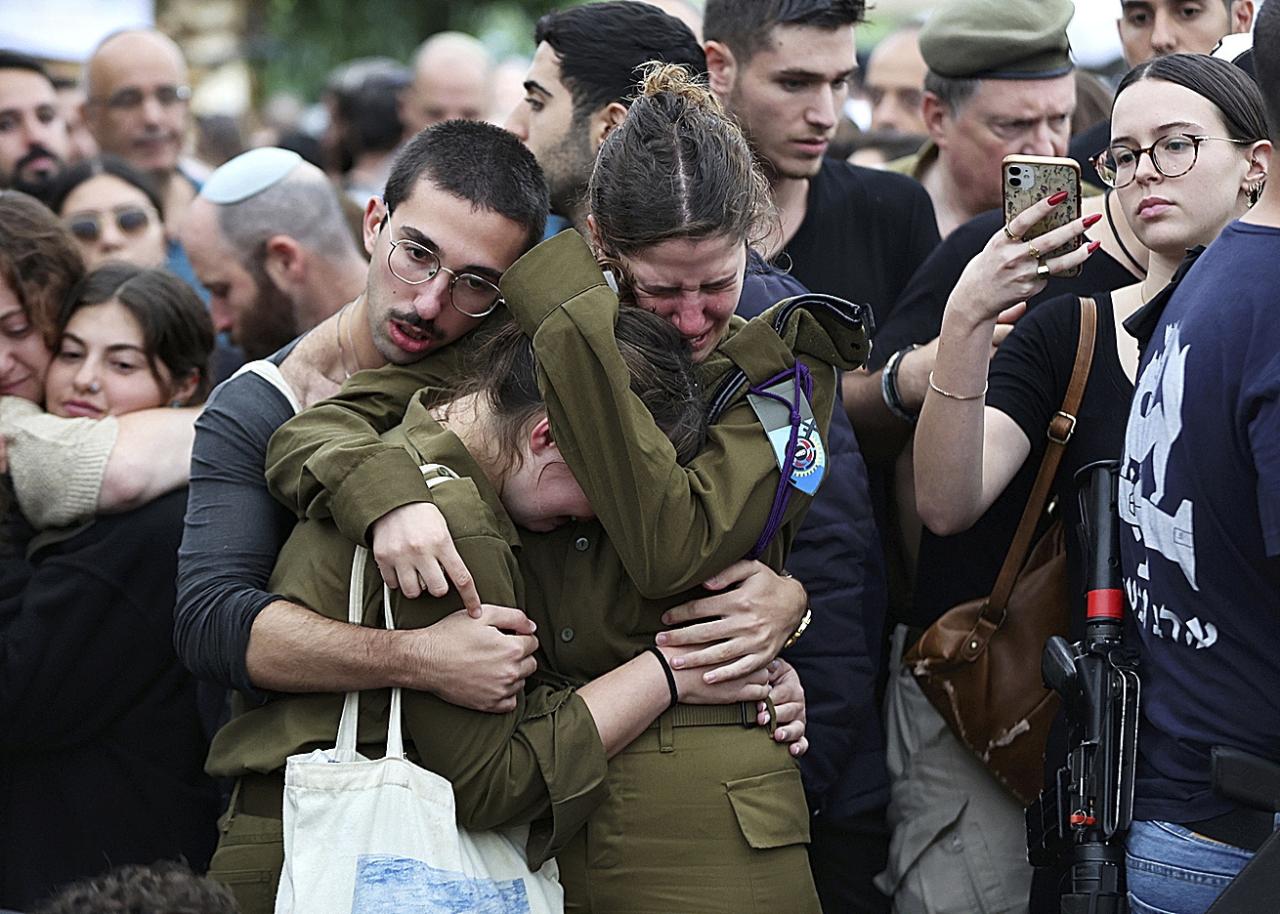
The relentless conflict between Hamas and Israel, coupled with the escalating tensions, has wrought devastating consequences on the civilian population in Gaza. The humanitarian crisis demands immediate attention and long-term solutions. The sheer scale of destruction, displacement, and loss of life underscores the urgent need for a sustained international response.The conflict has laid bare the fragility of life and the profound vulnerability of civilians caught in the crossfire.
The ongoing crisis in Gaza, involving UNRWA, Hamas, and Israel, is a complex issue with deep roots. Recent political maneuvering reminds me of the Supreme Court’s deference to corporate interests, like in the case of Koch Chevron, as detailed in this insightful article on koch chevron deference supreme court. Ultimately, these seemingly disparate issues highlight the interconnectedness of power and influence in global affairs, particularly concerning the humanitarian crisis in Gaza.
The impact on the civilian population is immeasurable, ranging from immediate physical harm to the long-term psychological trauma and societal disruption.
The ongoing Gaza crisis involving UNRWA, Hamas, and Israel is heartbreaking. Imagine the stark contrast with the luxurious world of snow polo in St. Moritz, where the very existence of this sport is threatened by climate change, as explored in this article: snow polo st moritz climate change. The fragility of life, in the face of such drastic environmental shifts, highlights the urgent need for global cooperation and understanding, especially in places like Gaza where the situation is so complex and deeply rooted.
Impact on the Civilian Population
The relentless bombardment and shelling have caused widespread destruction of infrastructure, homes, and essential services. The sheer volume of damage to homes and businesses has left countless families homeless and without access to basic necessities. Displacement is a significant concern, with numerous individuals and families forced to leave their homes due to the conflict. The loss of life, both direct and indirect, is a tragic consequence, adding another layer of suffering to the already dire situation.
The lack of access to medical care and clean water exacerbates the suffering, leading to preventable deaths and long-term health problems.
Role of UNRWA
UNRWA plays a crucial role in providing humanitarian aid and services to Palestinian refugees in Gaza. The organization delivers essential supplies, including food, water, shelter, and medical assistance. UNRWA’s sustained presence is vital for maintaining a lifeline of support for the affected population. Their logistical capabilities and established networks facilitate the delivery of aid to those in need, bridging gaps in resources and infrastructure.
Comparison of Humanitarian Responses
Several international organizations, including the Red Cross, Doctors Without Borders, and various governmental aid agencies, contribute to the humanitarian effort. Each organization brings unique expertise and resources to the table, focusing on specific aspects of the crisis, such as medical care, shelter provision, and psychological support. While there is a coordinated effort, differences in focus and approach exist, reflecting the diverse mandates and priorities of each organization.
Long-Term Effects
The conflict’s long-term effects on the lives of the people in Gaza are profound and far-reaching. The destruction of infrastructure and the displacement of populations have lasting economic and social consequences. The disruption of education and livelihoods for both children and adults has created a cycle of poverty and instability. The psychological impact, including trauma, anxiety, and fear, will have a profound and enduring impact on the affected populations.
Psychological Impact
The constant threat of violence and the witnessing of destruction have a profound and lasting impact on the mental well-being of the population. The trauma experienced by civilians during the conflict can manifest in various ways, including post-traumatic stress disorder (PTSD), anxiety, and depression. The lack of access to mental health services exacerbates the issue, highlighting the need for long-term psychological support and counseling programs.
The psychological toll is often overlooked in the immediate aftermath of conflict, but its long-term impact can be devastating.
Resources Allocated
| Organization | Type of Aid | Amount (Estimated) | Recipients |
|---|---|---|---|
| UNRWA | Food Assistance | $50 million | Over 1 million people |
| UNRWA | Shelter/Housing | $25 million | Over 100,000 people |
| UNRWA | Medical Assistance | $15 million | Over 500,000 people |
| Red Cross | Water and Sanitation | $10 million | Over 750,000 people |
| Doctors Without Borders | Medical Care | $8 million | Over 250,000 people |
| Other International Organizations | Various | $20 million | Multiple sectors of population |
Note: Figures are estimates and may vary depending on the source and the reporting period. The table is a simplified representation of the aid allocation. Many other organizations and governmental entities provide assistance, and the actual amounts may be significantly higher or lower than the estimates provided.
International Response
The ongoing conflict in Gaza has elicited a complex and varied international response. From diplomatic efforts to humanitarian aid, nations and organizations are grappling with the multifaceted crisis, though their approaches and effectiveness remain subjects of ongoing debate. The global community’s role in mediating a peaceful resolution, providing aid, and imposing sanctions is crucial in determining the future trajectory of the situation.
Roles of International Actors
Various international actors, including the United Nations, the European Union, and the United States, have played different but interconnected roles in addressing the conflict. The UN, with its extensive peacekeeping and humanitarian efforts, has been a key player in providing aid and advocating for a ceasefire. The EU has consistently condemned the violence and has actively sought diplomatic solutions.
The US, while also expressing concern, has adopted a more nuanced approach, often balancing its interests in the region with its humanitarian obligations.
Diplomatic Efforts
Numerous diplomatic efforts have been made to achieve a peaceful resolution. These efforts often involve shuttle diplomacy, mediated talks, and initiatives aimed at de-escalating tensions. The effectiveness of these efforts is often hampered by the deeply entrenched political positions of the involved parties. These diplomatic initiatives frequently face significant obstacles due to the complexity of the conflict and the lack of trust among the parties involved.
The ongoing crisis in Gaza, involving UNRWA, Hamas, and Israel, is deeply troubling. It’s a complex situation, and while I’m not an expert, it’s clear that understanding the nuances requires looking at broader contexts. For example, the career trajectory of Chita Rivera, a remarkable performer, chita rivera key moments career provides a fascinating glimpse into the world of artistic dedication, which can sometimes offer parallels in the face of adversity.
Ultimately, though, the struggles in Gaza deserve focused attention and compassionate solutions.
Statements by Key International Figures
Statements from key international figures on the situation reflect varying perspectives and priorities. These statements, often issued through official channels or public appearances, highlight the international community’s concern for the well-being of civilians and the need for a cessation of hostilities. The nuanced perspectives and approaches demonstrate the diverse range of interests at play.
International Sanctions and Restrictions
International sanctions and restrictions, while intended to pressure parties to de-escalate the conflict, can also have unintended consequences, particularly on the civilian population. These measures can disrupt essential services and hinder humanitarian aid delivery, thus exacerbating the crisis. Sanctions, although a potent tool in international relations, require careful consideration of their potential impact on vulnerable populations.
Comparison of Approaches
Different countries have adopted varying approaches to the conflict, often influenced by their own geopolitical interests and historical ties to the region. Some nations prioritize humanitarian aid, while others focus on diplomatic pressure on all parties involved. This diversity in approaches highlights the complexity of the conflict and the absence of a universally accepted solution.
International Organization Responses
| Organization | Action | Impact | Date |
|---|---|---|---|
| United Nations | Providing humanitarian aid, calling for ceasefire | Reduced suffering, but not enough to stop the fighting | Ongoing |
| European Union | Issuing condemnations, promoting diplomatic solutions | Limited impact on the immediate violence | Ongoing |
| United States | Mediation attempts, targeted sanctions | Mixed results; sanctions impact humanitarian access | Ongoing |
This table summarizes the actions of key international organizations in response to the conflict, showcasing the diversity of their interventions and their varied impacts.
UNRWA’s Role
UNRWA, the United Nations Relief and Works Agency for Palestine Refugees in the Near East, plays a crucial role in providing essential services to Palestinian refugees in Gaza. Its mandate, stemming from the aftermath of the 1948 Arab-Israeli war, encompasses a wide range of support, particularly in regions with high refugee concentrations. This necessitates a deep understanding of the agency’s responsibilities, challenges, and ongoing efforts to alleviate suffering.UNRWA’s core responsibility is to offer vital support to Palestinian refugees in the region, including Gaza.
The ongoing crisis in Gaza, involving UNRWA, Hamas, and Israel, is deeply troubling. While the situation there is incredibly complex, it’s easy to get caught up in the headlines. Interestingly, the incredible career of Adrian Beltre, a Texas Rangers legend, reminds us of the power of individual achievement and resilience, a quality often needed during times of conflict, and the struggle of people caught in the crossfire of the Gaza conflict.
Adrian Beltre’s Hall of Fame Texas Rangers career highlights the strength and determination of athletes, similar to the determination of people caught in the Gaza conflict. The Gaza situation continues to demand attention and support.
This involves a multifaceted approach, encompassing healthcare, education, and social services. The agency has a long history of engagement in these regions and has adapted its strategies to respond to the specific needs of displaced populations.
UNRWA’s Mandate and Responsibilities in Gaza
UNRWA’s mandate, enshrined in international agreements, dictates its commitment to providing essential services to Palestinian refugees. These services are categorized into several key areas, including education, healthcare, and relief assistance. The agency’s responsibility includes supporting the needs of children, women, and the elderly. This includes the provision of food aid, shelter, and access to essential resources. In Gaza, these responsibilities are amplified due to the region’s unique circumstances, including protracted conflict, blockade, and ongoing humanitarian crises.
UNRWA’s Challenges in Providing Services
Several challenges impede UNRWA’s ability to fully meet the needs of the Palestinian refugee population in Gaza. A major hurdle is the constant threat of conflict and violence. Infrastructure damage, security concerns, and the ever-present risk of escalation severely hamper the agency’s operational capacity. Additionally, the region’s limited resources and the ever-increasing demand for services exacerbate the challenges.
The ongoing Gaza situation, involving UNRWA, Hamas, and Israel, is incredibly complex. While the world watches these events unfold, it’s worth remembering that back home, important political processes like the Nevada caucus primary are also shaping our future. For a deeper understanding of this crucial primary, check out this helpful explainer on the Nevada caucus primary nevada caucus primary explainer.
Ultimately, these parallel events highlight the interconnectedness of global issues and the importance of staying informed.
The protracted blockade further restricts access to vital supplies and personnel, impeding the agency’s efforts to provide adequate support.
UNRWA’s Efforts to Support the Palestinian Population in Gaza
Despite these significant challenges, UNRWA remains committed to supporting the Palestinian population in Gaza. The agency continuously works to improve access to quality healthcare, education, and other critical services. UNRWA actively collaborates with local organizations and international partners to address the complex needs of the refugee community. The agency’s programs are tailored to the specific circumstances of Gaza, addressing issues such as malnutrition, unemployment, and the lack of access to essential services.
Financial Constraints and Limitations Faced by UNRWA
UNRWA faces substantial financial constraints in its operations. Funding shortages significantly limit the agency’s ability to expand its programs and adequately respond to the escalating needs of the refugee population. The ever-increasing demands, compounded by the ongoing conflict and the humanitarian crisis, exacerbate the financial strain on UNRWA. This lack of consistent funding impacts the quality and accessibility of the services provided.
Different Programs Implemented by UNRWA
UNRWA implements a variety of programs to meet the diverse needs of Palestinian refugees in Gaza. These programs include:
- Emergency Assistance: This involves providing immediate relief to individuals and families affected by emergencies, such as conflict or natural disasters. It includes distributing essential supplies, providing temporary shelter, and facilitating access to basic necessities.
- Education: UNRWA operates schools and educational programs for Palestinian refugee children, ensuring access to quality education. This often involves adapting curriculum and resources to the specific context of Gaza.
- Healthcare: The agency operates healthcare facilities and provides essential medical services, including primary care, maternal and child health services, and mental health support.
These programs are designed to address the specific needs of the refugee population, acknowledging the unique circumstances of Gaza.
Comparison of UNRWA’s Services with Other Aid Organizations
| Service | UNRWA | Other Org 1 (e.g., Doctors Without Borders) | Other Org 2 (e.g., Save the Children) |
|---|---|---|---|
| Emergency Food Assistance | Provides food parcels and vouchers to vulnerable families. | Focuses on immediate medical aid, often in crisis zones. | Provides emergency aid, including food and shelter, to children and families. |
| Education | Operates schools and educational programs for refugee children. | Provides educational materials and support to schools in conflict areas. | Focuses on education programs for vulnerable children, often focusing on specific age groups. |
| Healthcare | Operates clinics and hospitals, providing basic healthcare. | Provides specialized medical care, often focusing on specific health issues. | Supports healthcare initiatives for children, including vaccinations and health awareness programs. |
This table illustrates the overlapping and distinct roles various organizations play in assisting the Palestinian refugee population in Gaza. While UNRWA offers a broad range of services, other organizations often concentrate on specific areas or needs.
Hamas’s Role
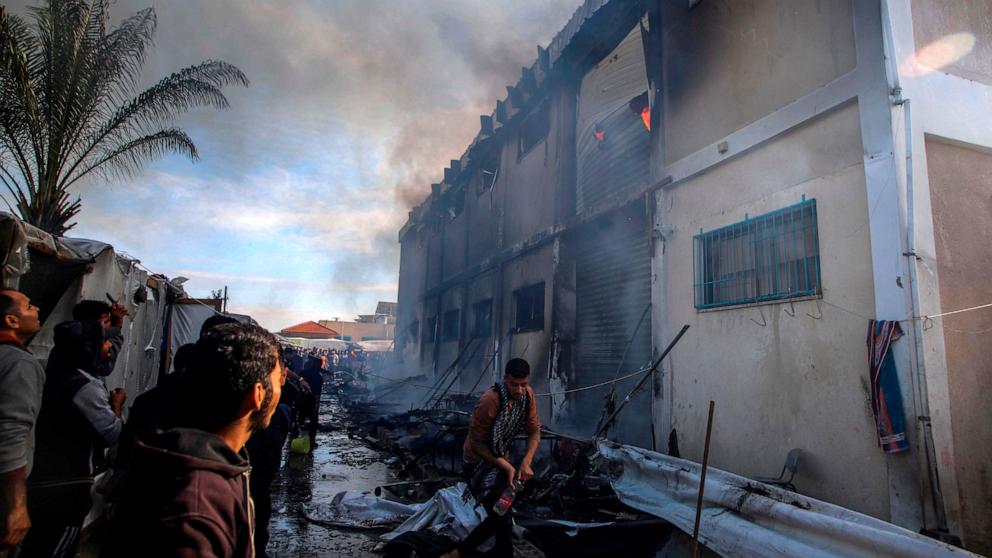
Hamas, an Islamist Palestinian political and armed organization, has played a complex and often controversial role in the Israeli-Palestinian conflict. Its relationship with the Palestinian population is multifaceted, encompassing both support and criticism. Understanding Hamas’s motivations, strategies, and interactions with other groups and the international community is crucial to comprehending the ongoing conflict in Gaza.
Hamas’s Relationship with the Palestinian Population
Hamas’s influence within Gaza is significant. It provides essential social services, including healthcare and education, which are often lacking or underfunded by other entities. This provision of services, alongside its strong religious and nationalist rhetoric, contributes to its popularity among segments of the Palestinian population. However, Hamas’s control has also been criticized for restricting freedoms and suppressing dissent. This complex relationship is characterized by both support and resentment, depending on individual circumstances and perspectives.
Hamas’s Political Objectives and Strategies
Hamas’s stated political objective is the establishment of an independent Palestinian state encompassing all of historical Palestine. This objective is achieved through a combination of political maneuvering and armed struggle. Their strategies involve using armed resistance, alongside political engagement where possible, to achieve their goals. This strategy often entails employing a variety of tactics, including military actions and political discourse, to advance their cause and exert influence on the international stage.
Hamas’s Relationship with Other Armed Groups
Hamas has a complex network of relationships with other armed groups, ranging from alliances to rivalries. These relationships are often based on shared political goals and strategic interests. Cooperation can facilitate joint operations, while conflicts can arise over territory, influence, or ideological differences. These interactions play a vital role in shaping the dynamics of the conflict and the broader regional context.
Hamas’s Interactions with the International Community
Hamas’s relationship with the international community is often fraught with tension and distrust. Its designation as a terrorist organization by several countries has limited its ability to engage in diplomatic efforts. Hamas’s rhetoric and actions are often viewed negatively by the international community, which has led to sanctions and limitations on its activities.
Hamas’s Actions in Gaza, Gaza unrwa hamas israel
Hamas’s actions within Gaza have had a profound impact on the lives of its citizens. These actions often involve both providing essential services and controlling aspects of daily life. Their actions in Gaza encompass various facets, from humanitarian aid to military operations. The nature and extent of these actions can fluctuate based on internal political developments and external pressures.
Summary of Hamas’s Key Actions and Statements
| Action | Date | Impact | Target |
|---|---|---|---|
| Launching rockets into Israel | Various dates | Escalation of violence, civilian casualties | Israeli military and civilian targets |
| Providing social services | Ongoing | Meeting basic needs of the population, fostering support | Palestinian population in Gaza |
| Engaging in political negotiations (when possible) | Various dates | Attempting to achieve political goals, negotiating terms | International actors, Israeli representatives |
Israel’s Role
Israel’s security concerns and actions within the region are deeply intertwined with its history and the ongoing conflict with Palestinian groups, particularly Hamas. These concerns are rooted in a perceived threat to its existence and the safety of its citizens, a perspective shaped by decades of conflict and violence. Israel’s policies and responses have significant implications for the Palestinian population and the broader regional stability.
Security Concerns and Policies
Israel faces a complex security landscape characterized by the persistent threat of attacks from various armed groups, including Hamas. These groups’ capabilities and intentions are assessed and analyzed continually, influencing Israeli policies and military strategies. The country’s security policies are driven by a desire to protect its citizens from terrorism and ensure its own survival. This is reflected in its approach to border control, military deployment, and intelligence gathering.
A core tenet of Israeli security policy is the prevention of attacks, which includes preemptive measures and military operations. Israel’s policy is often criticized for its impact on the Palestinian population, a criticism Israel acknowledges and often seeks to mitigate, although with limited success.
Israel’s Response to Hamas’s Actions
Israel’s response to Hamas’s actions is multifaceted, encompassing military operations, intelligence gathering, and diplomatic efforts. Hamas’s actions, such as rocket attacks and the 2023 conflict, are viewed as a direct threat, prompting Israel to defend its citizens and territory. The response includes retaliatory strikes, intended to disrupt Hamas’s capabilities and deter future attacks. The military actions are intended to maintain a balance between achieving security goals and minimizing collateral damage.
These actions, however, often lead to further escalation of the conflict.
Impact of Israeli Policies on the Palestinian Population
Israeli policies, particularly those related to security and settlement construction, have a profound impact on the Palestinian population. The construction of settlements in the West Bank, for example, restricts Palestinian movement and access to resources, impacting their livelihoods and freedom of movement. Strict border controls and security measures can significantly hinder Palestinian economic opportunities and create challenges for everyday life.
Israel has faced criticism for the perceived disproportionate impact of its policies on the Palestinian civilian population.
Israel’s Perspective on the Conflict
Israel’s perspective on the conflict emphasizes the need for security and the right to self-defense. Israel views the actions of Palestinian groups, like Hamas, as a threat to its very existence. The conflict is seen as an existential struggle, with the need to protect its citizens and territory. From this perspective, security measures are seen as essential and proportionate responses to the threat.
This perspective, however, is often contested by other parties and international bodies.
Relationship with Other Nations
Israel’s relationship with other nations is complex and often characterized by tensions. While Israel has strong alliances with several countries, particularly in the West, it faces challenges in its relationships with Arab nations and some other international actors. These relationships are influenced by differing views on the Israeli-Palestinian conflict. Some nations support Israel’s security concerns, while others are critical of its policies.
Military Actions, Dates, and Justifications
| Action | Date | Justification | Impact |
|---|---|---|---|
| Operation Protective Edge | 2014 | Hamas rocket attacks on Israeli civilians | Significant civilian casualties on both sides, increased tensions. |
| Operation Pillar of Defense | 2012 | Hamas rocket fire and tunnel attacks | Damage to infrastructure, significant casualties. |
| 2023 Conflict | 2023 | Escalation of Hamas attacks, including rocket fire and infiltration. | Extensive destruction of civilian infrastructure and casualties on both sides. |
Last Point
In conclusion, the conflict in Gaza, involving UNRWA, Hamas, and Israel, presents a multifaceted challenge. The historical context reveals the deep-seated grievances and evolving dynamics of the conflict. The current situation highlights the urgent humanitarian needs and the complex geopolitical forces at play. The international response, while varied, has not yet effectively brought about a lasting resolution. The crucial role of UNRWA and the perspectives of all involved parties must be considered to understand the complexity of the conflict.
The future of the region hinges on finding a sustainable path towards peace and justice for all.
Clarifying Questions: Gaza Unrwa Hamas Israel
What are the key differences between Hamas and Fatah?
Hamas and Fatah are two Palestinian political factions. Fatah is more secular and seeks a two-state solution. Hamas is more religiously oriented and has historically opposed the two-state solution, opting for the establishment of an independent Palestinian state across all historical Palestinian territories. These contrasting views significantly impact the political landscape of the region.
What is the current status of UNRWA’s funding?
UNRWA faces significant funding challenges, which directly impact its ability to provide essential services to Palestinian refugees. The fluctuating levels of international support influence the effectiveness of its programs.
How do sanctions impact the economy in Gaza?
Sanctions imposed on Gaza, often due to the actions of various parties, have a devastating impact on the economy. Limited access to resources, trade restrictions, and financial limitations cripple economic activity, causing widespread hardship for the population.

